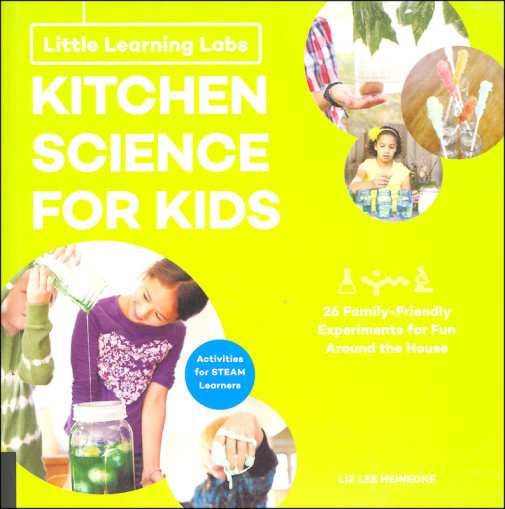We use cookies to make your experience better. To comply with the new e-Privacy directive, we need to ask for your consent to set the cookies. Learn more.
Little Learning Labs: Kitchen Science For Kids
An abridged edition of Kitchen Science Lab for Kids (item 002392). Topical units include chemical reactions, crystal gardens, physics and rockets, and more.
Cook up some science at home with Little Learning Labs: Kitchen Science for Kids. Conduct physics, chemistry, and biology experiments with tools and ingredients found in any kitchen.
The home provides an environment for freedom, creativity and invention—all important elements for great science. And you would never have guessed that science can be as easy as baking. It's simple, inexpensive, and fun to whip up amazing science experiments like straw rockets, green slime, and paper bag volcanoes using everyday ingredients.
In this abridged, paperback edition of Kitchen Science Lab for Kids, Little Learning Labs: Kitchen Science for Kids offers 26 fun science activities for families to do together. The experiments can be used as individual projects, for parties, or as educational activities for groups (perfect for Girl Scout Brownies looking to earn their Home Scientist badges). Many of the experiments are both safe enough for children as young as toddlers and exciting for older kids—fun for the whole family!
The popular Little Learning Labs series (based on the larger format Lab for Kids series) features a growing list of books that share hands-on activities and projects on a wide host of topics, including art, astronomy, geology, math, and even bugs—all authored by established experts in their fields. Each lab contains a complete materials list, clear step-by-step photographs of the process, as well as finished samples. The activities are open-ended, designed to be explored over and over, often with different results. Geared toward being taught or guided by adults, they are enriching for a range of ages and skill levels. Gain firsthand knowledge on your favorite topic with Little Learning Labs.
Focusing on topics children are naturally curious about, this practical series offers a variety of hands-on projects that use household items. Divided into units, activities begin with a material list, safety tips, and step-by-step instructions. Concluding the activities are creative enrichment suggestions and the science behind the activity. Includes full-color illustrations.
| Product Format: | Paperback |
|---|---|
| Brand: | Quarry Books |
| Author: | Liz Lee Heinecke |
| Grades: | 1-5 |
| ISBN: | 9781631595622 |
| Length in Inches: | 7.5 |
| Width in Inches: | 7.5 |
| Height in Inches: | 0.25 |
| Weight in Pounds: | 0.45 |

